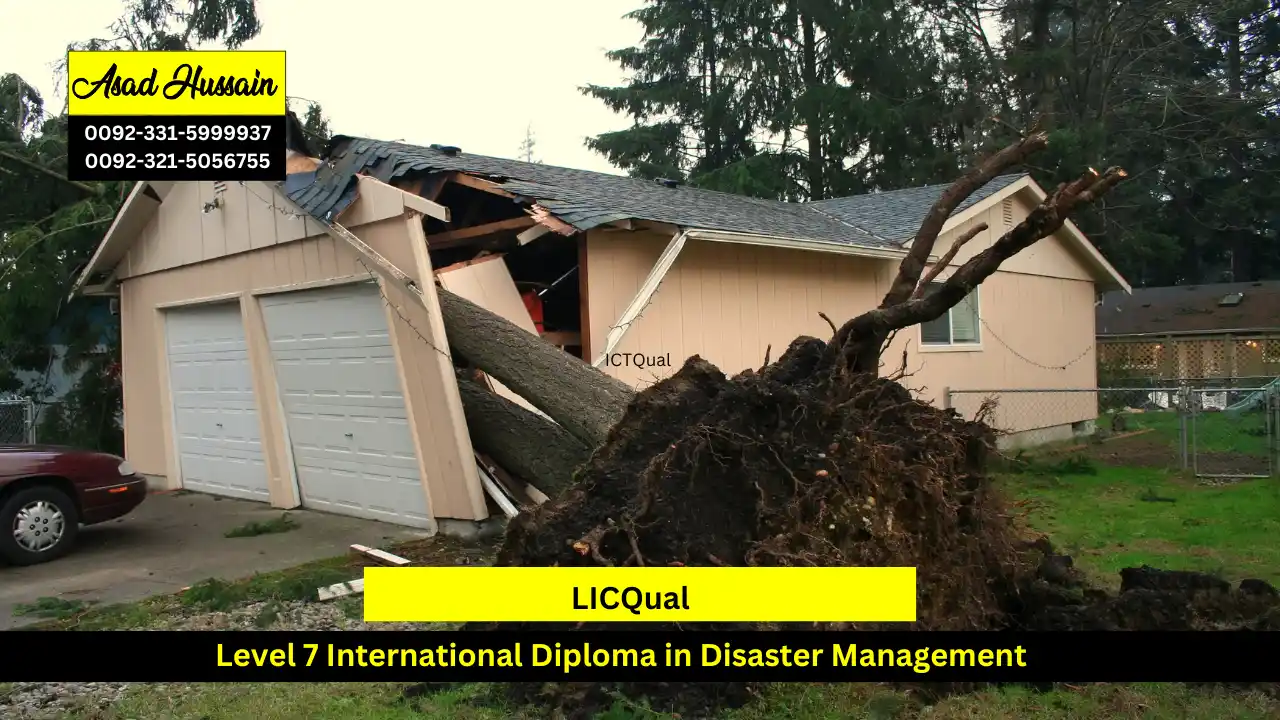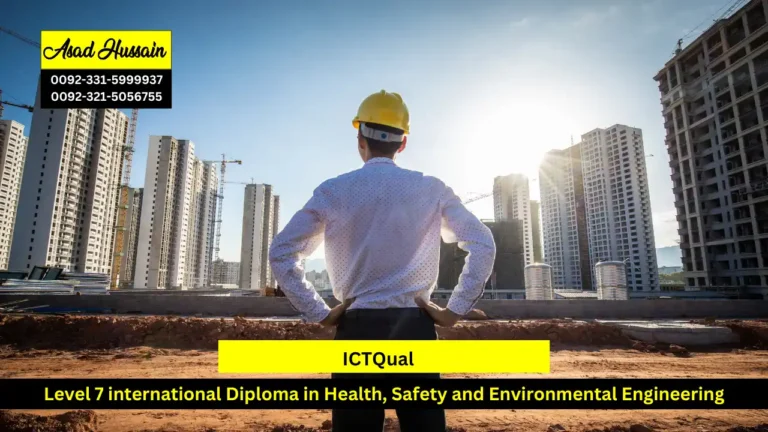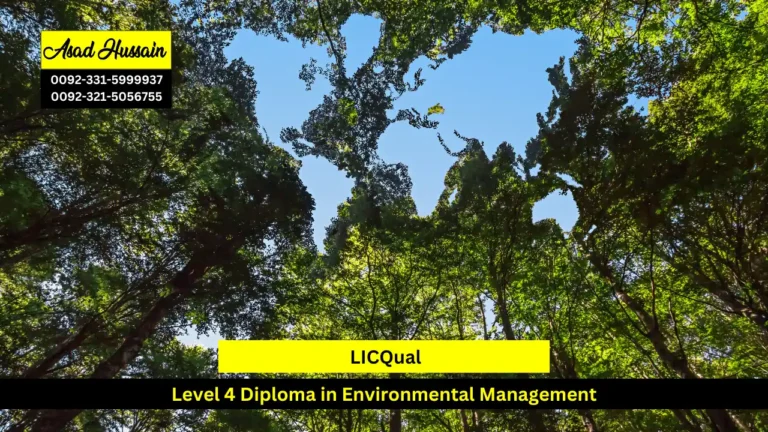In an era marked by unpredictable natural and human-made disasters, effective disaster management has never been more crucial. The Level 7 International Diploma in Disaster Management stands out as a comprehensive qualification designed for professionals aiming to master the complexities of disaster response, recovery, and mitigation. This blog post explores the key aspects of the Level 7 Diploma, its significance, and what it can offer to those seeking to excel in the field of disaster management.
The Level 7 International Diploma in Disaster Management is a postgraduate qualification that provides advanced knowledge and skills required to manage and mitigate disasters on a global scale. This diploma is typically targeted at senior professionals and managers who are responsible for coordinating disaster response efforts, developing disaster management strategies, and leading recovery initiatives.
The Level 7 International Diploma in Disaster Management is a vital qualification for those aiming to make a significant impact in the field of disaster management. By equipping professionals with advanced knowledge, strategic skills, and a global perspective, this diploma prepares them to tackle the challenges of modern disaster scenarios and lead effective response and recovery efforts. For individuals committed to enhancing their expertise and advancing their careers in this critical field, the Level 7 International Diploma represents a valuable and rewarding opportunity.
Program Highlights
Mandatory Units
- Unit 1. Principles of disaster management
- Unit 2. International Research: Confronting the Challenges of Disaster Risk Reduction and Development
- Unit 3. Disaster Resilience, Adaptation and Sustainability
- Unit 4. Vulnerability and Risk Assessment
- Unit 5. Advanced Research Methodology- Dissertation
- Unit 6. Participants – Governmental Disaster Management Agencies
Educational Qualifications
- Bachelor’s Degree: Applicants should generally hold a bachelor’s degree in a relevant field. Acceptable fields include disaster management, emergency services, environmental science, social sciences, public administration, or a related discipline.
- Postgraduate Experience: Some institutions may require or prefer candidates to have completed a relevant postgraduate qualification, such as a master’s degree in disaster management or a related area.
Professional Experience
- Relevant Work Experience: Candidates should have substantial professional experience in disaster management, emergency response, or a related field. Typically, a minimum of 3-5 years of relevant work experience is expected. This experience should include roles that demonstrate responsibility for managing or coordinating disaster-related activities.
- Leadership and Management Roles: Experience in senior or managerial positions is often required, as the diploma is aimed at professionals seeking to enhance their strategic and leadership skills.
English Language Proficiency
- For Non-Native Speakers: If English is not the applicant’s first language, they may need to demonstrate proficiency through standardized tests such as the IELTS (International English Language Testing System) or TOEFL (Test of English as a Foreign Language). Minimum score requirements vary by institution but are typically around IELTS 6.5 or TOEFL 90.
Supporting Documents
- Curriculum Vitae (CV): A detailed CV highlighting relevant work experience, qualifications, and professional achievements.
- Personal Statement: A personal statement or statement of purpose outlining the applicant’s motivation for pursuing the diploma, career goals, and how the qualification will contribute to their professional development.
- References: Professional references or letters of recommendation from supervisors or colleagues who can attest to the applicant’s experience and suitability for the course.
Interview (If Applicable)
- Interview Process: Some institutions may require candidates to undergo an interview as part of the selection process. This interview may assess the applicant’s motivation, experience, and suitability for the program.
Additional Requirements
- Professional Membership: In some cases, being a member of relevant professional organizations or bodies related to disaster management may be advantageous or required.
Principles of Disaster Management
- Understand Core Concepts: Demonstrate a comprehensive understanding of the fundamental principles of disaster management, including risk reduction, preparedness, response, and recovery.
- Apply Frameworks: Apply various disaster management frameworks and models to different types of disasters and emergency scenarios.
- Evaluate Strategies: Critically evaluate the effectiveness of different disaster management strategies and policies in various contexts.
- Develop Plans: Develop disaster management plans that incorporate best practices and principles for effective risk mitigation and response.
International Research: Confronting the Challenges of Disaster Risk Reduction and Development
- Analyze Global Issues: Analyze and assess the challenges faced by countries and organizations in disaster risk reduction and development on an international scale.
- Review Research Findings: Review and synthesize international research and case studies related to disaster risk reduction and sustainable development.
- Apply Research Methods: Apply advanced research methods to investigate and address global disaster management issues and propose evidence-based solutions.
- Understand Policies: Understand and critique international policies and frameworks related to disaster risk reduction and development.
Disaster Resilience, Adaptation, and Sustainability
- Evaluate Resilience Measures: Evaluate measures and strategies that enhance disaster resilience, adaptation, and sustainability at community, organizational, and national levels.
- Develop Adaptation Strategies: Develop and recommend adaptation strategies to improve disaster resilience and sustainability in various environments.
- Implement Best Practices: Implement best practices for integrating resilience and sustainability into disaster management planning and response efforts.
- Assess Impact: Assess the impact of resilience and adaptation measures on communities and organizations affected by disasters.
Vulnerability and Risk Assessment
- Conduct Assessments: Conduct comprehensive vulnerability and risk assessments to identify and evaluate potential hazards and their impacts on communities and infrastructure.
- Analyze Data: Analyze data related to vulnerability and risk factors, and use this information to inform disaster management strategies and interventions.
- Develop Mitigation Plans: Develop mitigation plans based on assessment findings to reduce vulnerabilities and manage risks effectively.
- Communicate Findings: Communicate assessment results and recommendations clearly to stakeholders and decision-makers.
Advanced Research Methodology – Dissertation
- Design Research Projects: Design and implement advanced research projects related to disaster management, employing appropriate research methodologies and techniques.
- Conduct Research: Conduct thorough and original research, including data collection, analysis, and interpretation, to contribute new insights to the field of disaster management.
- Write and Present Findings: Write and present a well-structured dissertation that demonstrates academic rigor, critical analysis, and contribution to the field.
- Demonstrate Scholarly Skills: Demonstrate scholarly skills in research methodology, data analysis, and academic writing.
Participants – Governmental Disaster Management Agencies
- Understand Agency Roles: Understand the roles and responsibilities of governmental disaster management agencies in the disaster management framework.
- Analyze Agency Operations: Analyze the operations, structures, and strategies of various governmental agencies involved in disaster management.
- Collaborate with Agencies: Develop strategies for effective collaboration and coordination with governmental disaster management agencies.
- Evaluate Agency Effectiveness: Evaluate the effectiveness of governmental disaster management agencies in responding to and managing disasters and recommend improvements.
The Level 7 International Diploma in Disaster Management is tailored for experienced professionals who are seeking to advance their careers and expertise in the field of disaster management. It is ideal for individuals currently working in roles such as disaster response coordinators, emergency planners, risk analysts, and humanitarian professionals, who are looking to deepen their knowledge and enhance their strategic skills. This course is particularly suited for senior managers and decision-makers within governmental agencies, non-governmental organizations, and international bodies involved in disaster management and recovery. Additionally, it is valuable for those aiming to transition into senior roles within the field, including positions related to policy development, strategic planning, and international disaster coordination. By offering advanced training in disaster management principles, research methodologies, and global best practices, the diploma equips participants with the expertise needed to tackle complex disaster scenarios and lead effective response and recovery efforts on a global scale.







